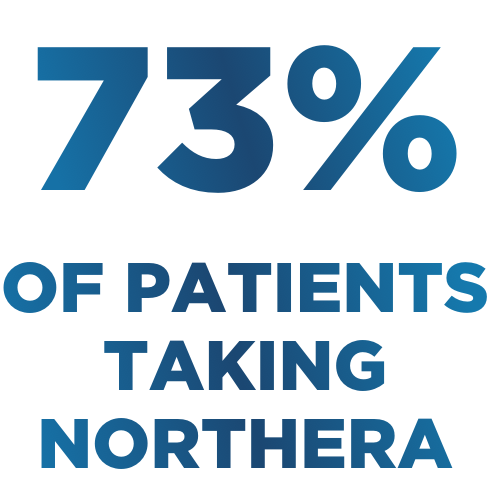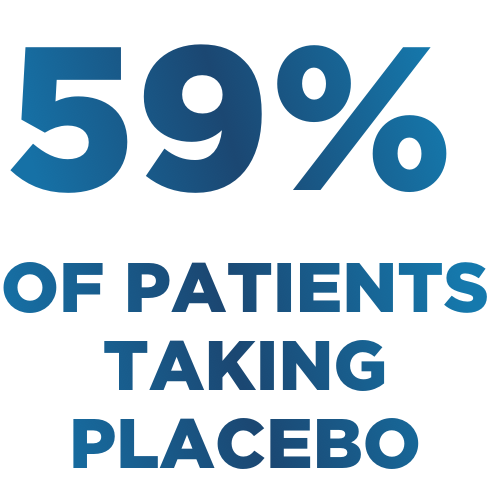NORTHERA® (droxidopa) has been studied in patients with symptomatic neurogenic orthostatic hypotension (nOH)
In a clinical study
Patients saw an improvement in symptoms of dizziness, lightheadedness, and “the feeling that you are about to black out” by week 1.



The FDA approval of NORTHERA was based on a clinical study of 171 adults with Parkinson’s disease and symptomatic nOH. Patients rated their symptoms on a scale of 0 to 10, with 0 being no symptoms at all and 10 being the most severe. After being treated for 1 week, patients taking NORTHERA reported a change of almost 1 point on the symptom scale compared to patients taking placebo (sugar pill), and reported a reduction in these symptoms.


Symptom scale
Before starting the study, patients on average rated their symptoms of dizziness, lightheadedness, and the feeling of being about to black out at about 5 on the scale.




had a reduction of these symptoms by 1 point or more on the symptom scale




NORTHERA may not work for everyone. Three clinical studies did not show a clear benefit from taking NORTHERA. The effectiveness of NORTHERA beyond 2 weeks of treatment has not been established, and your doctor will decide if you should continue taking NORTHERA.
THE SAFETY OF NORTHERA WAS BASED ON



The most common side effects of NORTHERA in the short-term studies were headache, dizziness, nausea, and high blood pressure.
Understanding supine hypertension
If you have symptomatic nOH, you may experience supine hypertension, which is high blood pressure when lying down. Like with low blood pressure when standing, the damage caused by your underlying nervous system disorder (such as Parkinson’s disease or multiple system atrophy [MSA]) can also affect your body’s ability to control your blood pressure when lying down. NORTHERA may cause or worsen supine hypertension, which can increase the risk of strokes and other cardiovascular events.
You can reduce the risk of supine hypertension by:

Elevating the head of your bed at least 30 degrees when lying down.
.png)
Taking your late afternoon dose of NORTHERA at least 3 hours before bedtime.
It is important to monitor your blood pressure before starting NORTHERA to set a baseline for yourself. This will help you and your doctor understand whether you are regularly experiencing high blood pressure when lying down due to your symptomatic nOH or if the cause may be due to taking NORTHERA. Talk to your doctor about any concerns you may have about supine hypertension.
Please see Important Safety Information, including Boxed Warning for supine hypertension.
For more information, see the full Prescribing Information.
Use
NORTHERA (droxidopa) is a prescription medication used to reduce dizziness, lightheadedness, or the “feeling that you are about to black out” in adults who experience a significant drop in blood pressure when changing positions or standing (called symptomatic neurogenic orthostatic hypotension (nOH)) and who have one of the following:
- Parkinson’s disease (PD), a neurodegenerative disease that causes slowness in muscle movement as well as shaking in the hands
- Multiple system atrophy (MSA), a Parkinson’s-like disorder with more widespread effects on the brain and body
- Pure autonomic failure (PAF), a neurodegenerative disease that results in frequent drops in blood pressure upon standing
- Dopamine beta-hydroxylase deficiency, a condition where the body cannot make enough of the hormones that help regulate blood pressure
- Non-diabetic autonomic neuropathy, an inability to maintain blood pressure upon standing that can be caused by a number of rare diseases
Effectiveness beyond 2 weeks of treatment has not been established, and your doctor will decide if you should continue taking NORTHERA.
IMPORTANT SAFETY INFORMATION
WARNING: SUPINE HYPERTENSION (this is high blood pressure while lying down)
When lying down, elevating the head and upper body lowers the risk of high blood pressure. Check your blood pressure in this position prior to starting and during NORTHERA treatment. If you experience high blood pressure, talk to your doctor about your NORTHERA treatment.
- Do not take NORTHERA if you have a known allergy to NORTHERA or its ingredients.
- NORTHERA may cause high blood pressure when lying down, which could lead to strokes, heart attacks, and death. To reduce this risk of supine hypertension, take your late afternoon dose of NORTHERA at least 3 hours before going to bed.
- Neuroleptic malignant syndrome (NMS) is a rare but potentially life-threatening side effect reported with NORTHERA. Call your doctor right away and go to the nearest emergency room if you develop these signs and symptoms: high fever, stiff muscles, movements that you cannot control, confusion or problems thinking, very fast or uneven heartbeats, or increased sweating. NORTHERA should be stopped immediately if NMS is diagnosed.
- If you have coronary artery disease, irregular heartbeat, or heart failure, NORTHERA may worsen the symptoms of these disorders. Call your doctor if your symptoms become worse.
- NORTHERA may cause allergic reactions. Stop taking NORTHERA and contact your doctor right away, or go to the nearest emergency room if you experience any signs or symptoms of an allergic reaction such as: fast heartbeat, nausea, vomiting, swelling, trouble breathing, hives, or rash. NORTHERA contains tartrazine (FD&C Yellow No. 5), which may also cause an allergic reaction, especially if you have had a reaction to aspirin.
- The most common side effects with NORTHERA are headache, dizziness, nausea, and high blood pressure.
- Taking NORTHERA with other medications may cause side effects. Tell your doctor if you take prescription or over-the-counter medicines, vitamins, or herbal supplements.
- You should not breastfeed during treatment with NORTHERA.
- If you plan to become or are currently pregnant, talk to your doctor as it is not known if NORTHERA could harm your unborn baby.
- Take NORTHERA the same way each time, either with or without food.
- If you miss a dose of NORTHERA, take your next dose at the regularly scheduled time. Do not double the dose.
For more information, please see the full Prescribing Information, including Boxed Warning for supine hypertension.
You are encouraged to report negative side effects of prescription drugs to the FDA. Visit www.fda.gov/medwatch, or call 1-800-FDA-10881-800-FDA-1088.
Please see Important Safety Information, including Boxed Warning for supine hypertension.
For more information, see the full Prescribing Information.
Use
NORTHERA (droxidopa) is a prescription medication used to reduce dizziness, lightheadedness, or the “feeling that you are about to black out” in adults who experience a significant drop in blood pressure when changing positions or standing (called symptomatic neurogenic orthostatic hypotension (nOH)) and who have one of the following:
- Parkinson’s disease (PD), a neurodegenerative disease that causes slowness in muscle movement as well as shaking in the hands
- Multiple system atrophy (MSA), a Parkinson’s-like disorder with more widespread effects on the brain and body
- Pure autonomic failure (PAF), a neurodegenerative disease that results in frequent drops in blood pressure upon standing
- Dopamine beta-hydroxylase deficiency, a condition where the body cannot make enough of the hormones that help regulate blood pressure
- Non-diabetic autonomic neuropathy, an inability to maintain blood pressure upon standing that can be caused by a number of rare diseases
Effectiveness beyond 2 weeks of treatment has not been established, and your doctor will decide if you should continue taking NORTHERA.
IMPORTANT SAFETY INFORMATION
WARNING: SUPINE HYPERTENSION (this is high blood pressure while lying down)
When lying down, elevating the head and upper body lowers the risk of high blood pressure. Check your blood pressure in this position prior to starting and during NORTHERA treatment. If you experience high blood pressure, talk to your doctor about your NORTHERA treatment.
- Do not take NORTHERA if you have a known allergy to NORTHERA or its ingredients.
- NORTHERA may cause high blood pressure when lying down, which could lead to strokes, heart attacks, and death. To reduce this risk of supine hypertension, take your late afternoon dose of NORTHERA at least 3 hours before going to bed.
- Neuroleptic malignant syndrome (NMS) is a rare but potentially life-threatening side effect reported with NORTHERA. Call your doctor right away and go to the nearest emergency room if you develop these signs and symptoms: high fever, stiff muscles, movements that you cannot control, confusion or problems thinking, very fast or uneven heartbeats, or increased sweating. NORTHERA should be stopped immediately if NMS is diagnosed.
- If you have coronary artery disease, irregular heartbeat, or heart failure, NORTHERA may worsen the symptoms of these disorders. Call your doctor if your symptoms become worse.
- NORTHERA may cause allergic reactions. Stop taking NORTHERA and contact your doctor right away, or go to the nearest emergency room if you experience any signs or symptoms of an allergic reaction such as: fast heartbeat, nausea, vomiting, swelling, trouble breathing, hives, or rash. NORTHERA contains tartrazine (FD&C Yellow No. 5), which may also cause an allergic reaction, especially if you have had a reaction to aspirin.
- The most common side effects with NORTHERA are headache, dizziness, nausea, and high blood pressure.
- Taking NORTHERA with other medications may cause side effects. Tell your doctor if you take prescription or over-the-counter medicines, vitamins, or herbal supplements.
- You should not breastfeed during treatment with NORTHERA.
- If you plan to become or are currently pregnant, talk to your doctor as it is not known if NORTHERA could harm your unborn baby.
- Take NORTHERA the same way each time, either with or without food.
- If you miss a dose of NORTHERA, take your next dose at the regularly scheduled time. Do not double the dose.
For more information, please see the full Prescribing Information, including Boxed Warning for supine hypertension.
You are encouraged to report negative side effects of prescription drugs to the FDA. Visit www.fda.gov/medwatch, or call 1-800-FDA-10881-800-FDA-1088.


